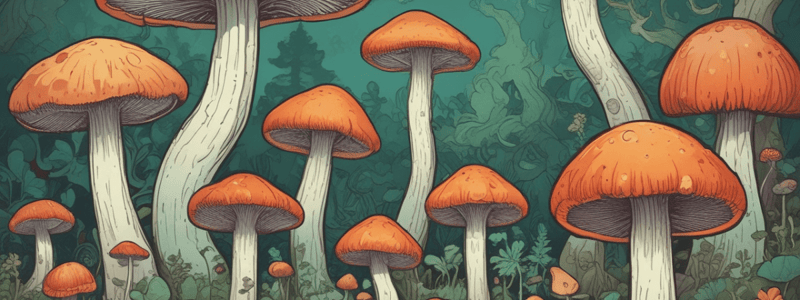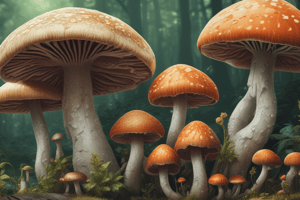Podcast
Questions and Answers
What is the predicted number of fungal species?
What is the predicted number of fungal species?
- unknown
- 100,000
- 90,000
- over 1.5 million (correct)
What mode of nutrition do fungi exhibit?
What mode of nutrition do fungi exhibit?
- chemoorganoheterotrophy (correct)
- photoheterotrophy
- phagotrophy
- autotrophy
What is the function of hydrolytic enzymes in fungi?
What is the function of hydrolytic enzymes in fungi?
- to absorb nutrients
- to regulate pH
- to break down organic matter (correct)
- to synthesize new compounds
What type of fungi are involved in mutualistic associations with plant roots?
What type of fungi are involved in mutualistic associations with plant roots?
What is the primary mode of reproduction in fungi?
What is the primary mode of reproduction in fungi?
What is the characteristic shape of yeast cells?
What is the characteristic shape of yeast cells?
What is the term for the vegetative structure of a fungus?
What is the term for the vegetative structure of a fungus?
What is the diameter range of fungal hyphae?
What is the diameter range of fungal hyphae?
What is the term for the mass of tangled hyphae?
What is the term for the mass of tangled hyphae?
What is a characteristic of fungi that distinguishes them from bacteria?
What is a characteristic of fungi that distinguishes them from bacteria?
What is the main function of septa in fungi?
What is the main function of septa in fungi?
What is the main component of the fungal cell wall?
What is the main component of the fungal cell wall?
What is the function of the Spitzenkorper?
What is the function of the Spitzenkorper?
What is the typical genome of a fungal cell?
What is the typical genome of a fungal cell?
What is the main function of vacuoles in fungal cells?
What is the main function of vacuoles in fungal cells?
What is the term for the union of cytoplasm from two parent mycelia?
What is the term for the union of cytoplasm from two parent mycelia?
What is the main function of mycorrhizae?
What is the main function of mycorrhizae?
What is the main difference between ectomycorrhizal and arbuscular mycorrhizal fungi?
What is the main difference between ectomycorrhizal and arbuscular mycorrhizal fungi?
What is the term for the process of asexual reproduction in fungi, where hyphae break apart and form new individuals?
What is the term for the process of asexual reproduction in fungi, where hyphae break apart and form new individuals?
What is the function of pheromones in fungi?
What is the function of pheromones in fungi?
Which of the following structures is responsible for determining the direction of hyphal growth?
Which of the following structures is responsible for determining the direction of hyphal growth?
What is the primary function of the plasma membrane in fungal cells?
What is the primary function of the plasma membrane in fungal cells?
Which of the following statements is true about the nuclei in fungal cells?
Which of the following statements is true about the nuclei in fungal cells?
What is the purpose of the heterokaryon stage in the fungal life cycle?
What is the purpose of the heterokaryon stage in the fungal life cycle?
What is the role of vesicles in the hyphal tip?
What is the role of vesicles in the hyphal tip?
Which of the following types of fungal growth is characterized by the formation of sheaths of hyphae over a root?
Which of the following types of fungal growth is characterized by the formation of sheaths of hyphae over a root?
What is the purpose of the dikaryotic stage in the fungal life cycle?
What is the purpose of the dikaryotic stage in the fungal life cycle?
What is the function of ergosterol in fungal cells?
What is the function of ergosterol in fungal cells?
Which of the following is a characteristic of fungal cells that distinguishes them from animal cells?
Which of the following is a characteristic of fungal cells that distinguishes them from animal cells?
What is the purpose of the sexual signalling molecules called pheromones in fungi?
What is the purpose of the sexual signalling molecules called pheromones in fungi?
What is the primary mechanism by which fungi acquire nutrients?
What is the primary mechanism by which fungi acquire nutrients?
What is the primary function of mycelium in fungi?
What is the primary function of mycelium in fungi?
What distinguishes fungi from other organisms that are also heterotrophic?
What distinguishes fungi from other organisms that are also heterotrophic?
What is the typical shape of multicellular fungi?
What is the typical shape of multicellular fungi?
What is the primary role of aerobic respiration in fungi?
What is the primary role of aerobic respiration in fungi?
What is the characteristic that distinguishes fungi from bacteria?
What is the characteristic that distinguishes fungi from bacteria?
What is the primary function of fermentation in yeast?
What is the primary function of fermentation in yeast?
What is the term for the association between fungi and algae or cyanobacteria?
What is the term for the association between fungi and algae or cyanobacteria?
What is the characteristic of fungal hyphae?
What is the characteristic of fungal hyphae?
What is the primary function of saprophytic fungi?
What is the primary function of saprophytic fungi?
Flashcards are hidden until you start studying
Study Notes
Fungi Overview
- Fungi primarily inhabit terrestrial environments, with few species found in aquatic ecosystems, and are distributed globally from polar to tropical regions.
- Approximately 90,000 fungal species have been described, but estimates suggest there may be over 1.5 million species in total.
- Lacking chloroplasts or plastids, fungi are classified as chemoorganoheterotrophs, obtaining nutrients by secreting enzymes to digest food externally and absorbing the resulting molecules.
Types and Roles of Fungi
- Fungi are categorized as saprophytes, pathogens, or mutualists, with saprophytic species playing critical roles as biodegraders, particularly in breaking down lignin and cellulose.
- Mutualistic associations include mycorrhizae with plant roots and lichens formed with algae or cyanobacteria.
- Most fungi are aerobic organisms; however, some yeasts are facultative anaerobes or obligate anaerobes, with fermentation being significant in industrial applications.
Fungal Structure
- The body structure of fungi, known as thallus, comprises long, branched hyphal filaments that form a dense mycelium.
- Fungi can exhibit a range of sizes, from unicellular yeasts to extensive multicellular forms.
- Unicellular fungi can exist in colonies and can retain purple dye during Gram staining. They are oval or egg-shaped and contain a single nucleus.
Hyphal Characteristics
- Multicellular fungi are referred to as molds, characterized by hyphae measuring between 2 to 30 micrometers in diameter.
- Hyphae may be divided by cross walls called septa, which provide structural support and minimize damage; other fungi have continuous hyphal structures without septa.
- Growth occurs primarily at the tip of the hyphae, where a high density of vesicles is produced from the Golgi apparatus.
Reproductive Processes
- Fungal reproduction can occur through binary fission, budding, or spore formation, with spores being crucial for dispersal.
- Most fungal nuclei are usually haploid except during transient diploid phases that occur during sexual reproduction.
- Fungi communicate mating types using pheromones, and sexual reproduction requires the fusion of hyphae from different mating types.
Sexual Reproduction Stages
- Plasmogamy refers to the fusion of cytoplasm from two parent mycelia, leading to a heterokaryotic phase where haploid nuclei coexist.
- In some species, these nuclei may pair off, resulting in a dikaryotic mycelium, where two haploid nuclei share a cell.
Mycorrhizal Relationships
- Mycorrhizae involve mutually beneficial interactions between fungi and plant roots, enhancing nutrient absorption.
- Ectomycorrhizal fungi form protective sheaths and extend into the root cortex, while arbuscular mycorrhizal fungi penetrate root cell walls and form tubular structures within the cells.
Cellular and Membrane Structure
- Fungal cells feature ergosterol-containing membranes and walls composed of chitin, providing structural integrity and protection against various threats.
- Many fungi are capable of switching between yeast and filamentous forms, responding to environmental changes such as temperature and carbon dioxide levels.
- Vacuoles within fungal cells help regulate pH and contribute to cellular expansion and contraction.
Fungal Growth Dynamics
- Normal vegetative growth in fungi is achieved through mitotic processes, with asexual reproduction also occurring via hyphal fragmentation and sporulation.
- Fungal versatility allows adaptation to different growth conditions, influencing their life cycle and form in relation to either pathogenicity or saprophytic functionalities.
Studying That Suits You
Use AI to generate personalized quizzes and flashcards to suit your learning preferences.



